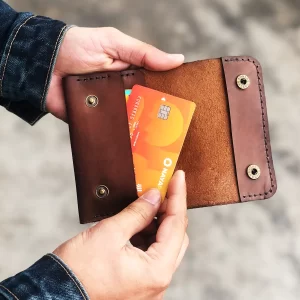
Contemporary Wallets: Adopting Technology for Convenience and Security
The days of using wallets as simple leather pouches to hold credit cards and cash are long gone. Even wallets have changed dramatically in the fast-paced world of today, when technology is a big part of our everyday lives. With the integration of cutting-edge technology, modern wallets now provide consumers with security, convenience, and other benefits. Let’s investigate the advantages that contemporary wallets have to offer.
Modern Wallets: What are They?
Ingenious accessories, modern wallets hold many cards, coins, and other necessities in addition to cash. Premium materials like carbon fiber, aluminum, or RFID-blocking textiles are usually used in their construction to guarantee longevity and safeguard against digital theft.
Wallet Development: From Leather to Technology

The origins of wallets can be found in the prehistoric era when humans carried their possessions in basic leather or fabric pouches. These wallets changed over time, growing increasingly complex with the addition of pockets and different styles. Modern wallets are the result of classic wallet designs being disrupted by technological advancements in recent years.
The Benefits of Contemporary Wallets
Portability and Convenience
Convenience for the user is a priority in the design of contemporary wallets. Because they are lightweight, thin, and small, they fit easily in pockets or bags without adding extra bulk. These wallets simplify our daily routines by providing quick and simple access to cash, cards, and other necessities.
Improved Security Capabilities
Modern wallets prioritize security above anything else. RFID-blocking technology is found in a lot of modern wallets, shielding your cards from identity theft and electronic pickpocketing. Some even include biometric authentication, which adds another degree of protection to keep your belongings safe.
Multifunctionality and Digital Integration
The multifunctionality of modern wallets is a result of technology integration. Certain wallets can establish a connection with your smartphone, enabling you to monitor their whereabouts and get alerts in case you misplace them. Digital wallets also make it possible to make contactless payments, which eliminates the need to carry physical cards.
The Drawbacks of Contemporary Wallets

Security Issues
The susceptibility of digital wallets to cyberattacks is one of the main worries. Significant dangers are associated with hacking and data breaches, which can result in identity theft and financial losses. Users need to utilize two-factor authentication, create strong passwords, and use trustworthy wallet providers with reliable encryption methods to protect themselves from these kinds of assaults.
Reliance on Technology
For users of digital wallets, the dependence on cell phones and internet access is a double-edged sword. Although it’s convenient, it also means that in times of emergency, like network outages or gadget problems, getting access to money could be difficult. To maintain financial accessibility, physical payment options must always be backup plans.
Concerns Regarding Privacy
Digital wallets’ ease of use is accompanied by certain privacy risks. Wallet providers may gather and use personal information for a variety of reasons, which raises concerns about data security and user privacy. Consumers should carefully read privacy policies and select wallets that place a high value on protecting their private data.
Interoperability and Compatibility
The seamless functioning of digital wallets may be impeded by compatibility problems with specific devices or systems. Additionally, because there is a lack of industry standardization, transferring money across wallets might be difficult. Establishing a more interoperable system requires teamwork.
Transaction Charges
Although digital wallets facilitate speedy and easy transactions, there are frequently fees associated with using them. For users to choose their payment methods wisely, they need to be aware of these fees and weigh them against standard banking expenses. Minimizing transaction costs can be achieved by implementing cost-cutting techniques.
Restricted Acceptance
Even though digital wallets are becoming more common, not all retailers accept digital payments. Wallet usage is restricted by this restriction, particularly in some areas. The acceptance of digital payment systems can be increased by enticing more companies to use them and informing customers about their advantages.
Selecting the Ideal Modern Wallet for your Requirements

Think About your way of Life
A modern wallet or cardholder should take your everyday demands and lifestyle into account. For instance, if you commute or travel regularly, a strong, thin wallet with RFID-blocking capabilities would be perfect.
Components and Sturdiness
The wallet’s durability is largely dependent on its material. To ensure that your wallet can survive regular wear and tear, choose materials such as metal, carbon fiber, or leather that are of a high grade.
Both aesthetics and design
Contemporary wallets are available in a multitude of patterns and hues. Pick a pink wallet or pink cardholder that complements your style and is both useful and practical.
Summary
Finally, in our day and age, wallets have evolved into essential accessories. They provide a seamless experience for carrying out our needs by combining design, security, and functionality. There is surely a modern wallet to fit your needs and personality among the many styles and designs available.



